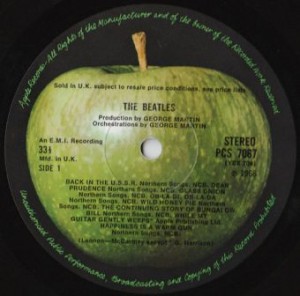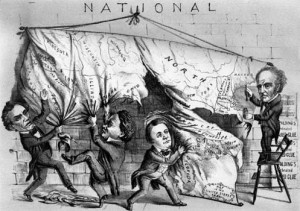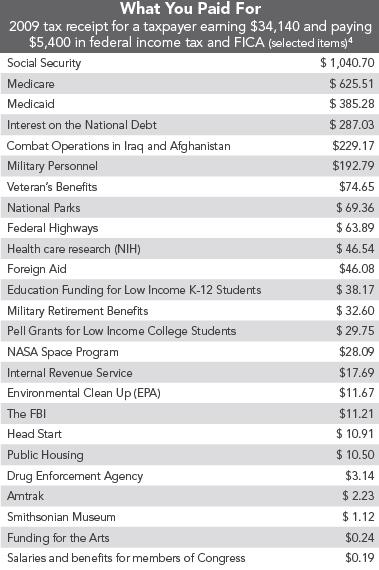What can we say about the Miami heat, one game into the season? Let’s do some Bayesian mathematical analysis… Continue reading
Monthly Archives: October 2010
A Provisional Re-sequencing of the White Album
 I call bullshit on anyone who says The Beatles is a well-sequenced album. It isn’t. Oh, it has it’s moments, especially the synergy created by some of the transitions and sub-sequencing decisions: the sound of the jet landing at the end of Back in the U.S.S.R. just as the guitar begins on Dear Prudence; the pairing of Mother Nature’s Son with Everybody’s Got Something to Hide; the musical jolt produced by the acoustic guitar opening to Cry Baby Cry seconds after the distorted horn end of Savoy Truffle (and the entire Honey Pie – Savoy Truffle – Cry Baby Cry triple is a nice organizational choice). The beginning and ending songs for each side are also nice choices, particularly on side two, pairing Martha My Dear at the top with Julia at the bottom.
I call bullshit on anyone who says The Beatles is a well-sequenced album. It isn’t. Oh, it has it’s moments, especially the synergy created by some of the transitions and sub-sequencing decisions: the sound of the jet landing at the end of Back in the U.S.S.R. just as the guitar begins on Dear Prudence; the pairing of Mother Nature’s Son with Everybody’s Got Something to Hide; the musical jolt produced by the acoustic guitar opening to Cry Baby Cry seconds after the distorted horn end of Savoy Truffle (and the entire Honey Pie – Savoy Truffle – Cry Baby Cry triple is a nice organizational choice). The beginning and ending songs for each side are also nice choices, particularly on side two, pairing Martha My Dear at the top with Julia at the bottom.
But anyone who isn’t frustrated by the ordering on this album is deluding themselves, probably because they’ve listened to it so many times that the original ordering has become imprinted on their brain. The entire balance of the record is completely off — side 1 was obviously well thought-out, but the rest of the album has the unmistakeable air of sequencing slap-dash. Side 3, in particular, lurches around like a drunken demo tape. There’s absolutely no excuse for putting Yer Blues, Everybody’s Got Something to Hide, Helter Skelter, and Long, Long, Long on the same side of a double record — the whole side manages to never get started and yet still wander around aimlessly. A classic whole-is-less-than-the-sum-of-it’s-parts moment. Those are all decent songs (well, all except Yer Blues), but they just kill each other so close together. I don’t think anyone has ever listened to side 3 and not had a fleeting moment of boredom. And that gave some of those songs a bad rap.
I’m not saying the White Album sequencing needs a little improvement. I’m saying that a random iTunes shuffle of the White Album is unlikely to detract from it’s listen-ability, and that a random shuffle with a few constraints would almost automatically improve the overall experience of a straight listen-through. I’ll have a full essay on this soon enough, but for now here is my provisional alternative sequence, with a few notes afterwards: Continue reading
Cold Fusion
 This is an article about political fusion. But it won’t seem that way for several paragraphs.
This is an article about political fusion. But it won’t seem that way for several paragraphs.
From pretty much any perspective you want to look — drama, comedy, tragedy, intrigue, farce, oddity, chaos, what if, — it’s pretty hard, among political events, to beat the 1860 Presidential election.
From a basic “what happened” standpoint, it’s easily the most unique election in American history. There were four candidates, representing three parties. One of the parties — the Democrats — had imploded at its convention in May and split into two factions. The second party — the Republicans — did not exist seven years prior. And the third party — the Constitutional Unionist — did not exist seven months prior.
The 1860 election also marked the collapse of the Presidential election system that had been devised by the Founders in 1787, and their attempt to build a system that required candidates who sought the Presidency to acquire a national following with strength in all areas of the country. None of the four candidates in 1860 were able to do this (and no single candidate for President would win a majority of the vote in both the North and South again until 1932): Continue reading
Social Network
People my exact age have a strange relationship with the Internet, for a very specific reason: we were college freshman in Fall 1996, the year the Internet exploded on college campuses. It was a strange time: none of the juniors or seniors really used email, but all of the freshmen did. Most freshmen used AIM or ICQ to communicate with each other on campus; if you got a phone call, it was probably an upperclassmen. And so on. So while most of the campus was effectively going to college in 1975, most the freshman were effectively going to college in 2002. I suspect the gap has never been as large, before or since. It was truly a technological divide — between people born merely a few years apart.
It was also a simpler time in regard to the internet itself. We were amazed by the trivial — chain email forwards were still cool, and could still produce mass hysteria — and spent much of time trying to find things, which meant going through Webcrawler, Yahoo, Lycos, Altavista, and all the rest of the awful search enginges until you succeeded. But it wasn’t clear what we were looking for — without the blogs, the .MP3s, online poker, or facebook, there was nothing really to do online except look at pornography or play silly games or just generally marvel at the whole situation.
It was, perhaps, the perfect moment of the modern age to be a college freshman.
The other option, of course, was to get rich. None of us bothered, but it wasn’t for lack of being very, very close to some huge ideas. Two that come to mind: Continue reading
On the idea that both parties might prefer not to control the House
This seems to be one of those pieces of counter-intuitive, chattering class conventional wisdom that bubble up every so often. I’m hearing it a lot from both directions. Heck, I’ve made the case myself. A lot of people seem to think that the Democrats would be better off losing the House. And a growing number of people think the GOP would be better off not gaining control of the House. (Note that I’m not talking about Mickey Kaus’s theory that the GOP leadership would prefer a small majority to a large one. That is a different debate on a different dimension of issues).
It’s an interesting proposition, and usually goes something like this: if the Democrats lose Congress, the GOP will probably have a very small majority. They’ll be able to investigate the executive branch, but the prospects for them passing their program are almost nil – they will have a small majority and, beside, Obama will veto anything truly odorous that they pass. They will be unable to do anything, and the President will finally have a decent opponent to attack. Consequence: we win a big Democratic victory in 2012, which is more important anyway.
Or the GOP version: the economy is in the tank. If we win control of the House, or the House and Senate, we’ll be saddled with owning the economy. And even if our policies could guarantee recovery, there’s an excellent chance we won’t be able to pass them over an Obama veto. So we’d be better off just cutting into Pelosi and Reid’s majority, but leaving them in total theoretical control but, in practice, without much ability to pass things. They can own the economy for the next two years, and in 2013 we’ll have all three branches, and probably a natural economic recovery to ride.
Here are four thoughts on all of this: Continue reading
On the idea of a “taxpayer’s receipt”
There’s a new white paper out from Third Way, a progressive think tank, that is making a lot of headlines on various blogs for its proposal that all taxpayers receive an itemized “receipt” showing where their taxes go. As an example of what the receipt would entail, look at the graphic from Third Way.
Intuitively, this is a nice idea. It lets the average person see very clearly that the cost of some things (like war and social program entitlements) is enormous compared to the cost of other things (like the salaries of members of Congress). It lets the average person develop a more-informed opinion about how certain spending cuts would affect the budget. And, not unimportantly, it reminds people that the federal taxes pay for actual, you know, things. That cost actual money.
However, there are significant drawbacks to this idea, at least as currently proposed. Enough so that I don’t think I would endorse this as good policy, and I worry that fixing the concerns would destroy the gains achieved through teh simplicity of the Third Way example. Here are five concerns: Continue reading

